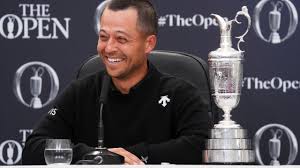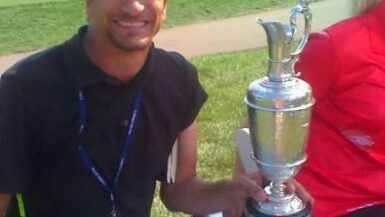SPRINGFIELD, NJ – As night falls at Baltusrol and the forest-draped mountain is shrouded by low clouds, the waning crescent moon shines feebly in the overcast sky. Finally, the promised rain came, just a thin shower, but I was too late. Against all predictions, the 2016 PGA Championship finished on time Sunday night. Inside the clubhouse amber lights burn cheerfully in every window as the members tuck into dinner with their newly-minted champion. It’s a scene that’s been repeated at this august club for over a century.
This year they toast Jimmy Walker. A late bloomer, Walker, 37, spent 13 years on Tour before finally breaking through with his maiden victory at the Fry’s.com Open. But then he went on a tear, winning three times in eight tournaments after starting his career going winless for his first 187 events. In 2014 he not only made he cut in every major, he had three top-10s.
But then he faded again just as quickly, barely making the cut in three of the four majors last year and missing the cut at the Masters, U.S. Open, and Open Championships this year. He came into this PGA Championship a complete afterthought.
That 65 on Thursday woke everyone up with a thunderclap though; that was his trigger for the week. Walker led after every round, a wire-to-wire winner, though Robert Streb shared the 36-hole lead with him. Like Lee Janzen in 1993, Walker fired four rounds in the 60s. Closing with 36 holes on Sunday – a solid 68-67 – he didn’t card a bogey in his final 28 holes.
That’s clutch with birdie machines and major champions like Jason Day, Martin Kaymer, and Henrik Stenson chasing you. Day nearly caught him with a sensational eagle at the par-5 72nd hole, (2-iron off the tee, 2-iron into the green and a 20-foot putt on the 545 yard hole), and it took a late birdie at 17 to provide Walker with the final margin.
Now the big question is whether Walker can stay at the top of his game and win more majors, or whether he’ll vanish back into the pack from whence he came? In fact, that’s frequently the question with PGA Championship winners. Since 1957, the year the event went to stroke play, 26 golfers have made the PGA their only major win. They are, in reverse chronological order:
Jimmy Walker, Jason Day, Jason Dufner, Keegan Bradley, Y.E. Yang, Rich Beem, Shaun Micheel, David Toms, Davis Love III, Mark Brooks, Steve Elkington, Paul Azinger, Wayne Grady, Bob Tway, Jeff Sluman, Hal Sutton, John Mahaffey, Lanny Wadkins, Don January, Al Geiberger, Dave Marr, Bobby Nichols, Jerry Barber, Jay Hebert, Bob Rosberg, and Dow Finsterwald.
None of those men are immortals, and only a few are Hall of Famers right now. Some are downright obscure. Heck, most people couldn’t pick Wayne Grady out of a line-up of George Clinton and his Parliament Funkadelic band. (Hint: he’s not the one with the rainbow dreadlocks singing “Make my funk the P-funk.…”)
By comparison, since 1957 only 17 players have made the Open Championship their only major win, and several of them were luminaries. Tom Weiskopf, of course, won 16 times on the PGA Tour in 14 years. By age 32 Champagne Tony Lema had bagged the ’64 Open and 22 wins. Then he and his wife died when his plane crashed into water hazard on an Illinois golf course. (People still morbidly joke that it was the only green he missed all year.) And Roberto DiVicenzo’s name might not be on this list but for his signing an incorrect scorecard at the 1968 Masters. It cost him a spot in a playoff with Bob Goalby. It’s unfortunate he’s remembered more for that morality play than for winning over 200 times worldwide, including the 1967 Open Championship at Royal Liverpool.
Again using 1957 as the starting point, 19 men have made the U.S. Open their only major win, including Tom Kite, who won 21 times on the PGA and European Tours. Before the advent of Mike Davis and his graded rough the U.S. Open saw its share of methodical plodders winning by making the fewest bogeys rather than the most dramatic birdies. Once a decade you’d get a fluke winner. Ed Furgol, Orville Moody, Lou Graham, Scott Simpson, Steve Jones, Michael Campbell, and Lucas Glover leap to mind as glaring examples.
As an aside, people keep trying to add Webb Simpson’s name to that list, but he’s got four wins on Tour already and he’s only 31. He also competes well on all four types of courses on which the majors are held.
The Masters has the fewest single-major winners – 16 – probably because it’s an invitational with a smaller field that is made up exclusively of winners on the Tour and past major champions who get varying length-exemptions. (Masters winners can play until they’re 65.) It’s a more august and accomplished field that tees it up at Augusta National each spring. Occasionally you get a surprise – George Archer and Charles Coody both backed into Butler Cabin, and Ian Woosnam took the Green Jacket home to either Wales or Hobbiton, take your pick.
This is the first year we’ve had four first time major winners since 2011 when Charl Schwartzel, Rory McIlroy, Darren Clarke, and Keegan Bradley won, chronologically, the season’s majors. Before that it was 2003 and Mike Weir, Jim Furyk, Ben Curtis, and Shaun Micheel.
That’s like getting dealt 7-2 in a game of Texas Hold’em.
So which of this year’s four winners will win another major? Logic and media dictate, Dustin Johnson and Henrik Stenson; they are the bigger, more recognizable names. Then again many pundits never would have picked Danny Willett or Jimmy Walker to win in the first place, would they? Willett may have – somewhat – backed in to his Green Jacket, but Walker had every opportunity told fold and didn’t, despite being expected to when facing hard charging defending champion Jason Day. Walker holed out a bunker shot on 10, then birdied 11 as well. He carried a two shot lead to the 17th and effectively iced the tournament with a birdie on the iconic, behemoth, and historic 660-yard 17th.
It was enough to give him the cushion he needed when Day, gladiator that he is, eagled 18 as if to say “Don’t you forget about me!”
In truth, there’s really no guaranteeing who will or who won’t win multiple majors. Andy North won two U.S. Opens and a Westchester Classic…and that was it. In the modern vernacular of the sports world he supposedly “validated” his first Open with the second, but all “validation” is the media’s way of saying “We thought the first one was a fluke.” The ironic things is that some popular players get passes on that – you didn’t hear anyone say DJ or Stens had to “validate” their win, did you.
On that note, anyone who thinks a 63 on Sunday to win on a course like Troon needs validation should be fired on general principle and forced to pick beans on a farm in New Hampshire for the rest of his/her life. That’s more their speed than journalism.
Many will suggest DJ doesn’t need “validation” either, because he’s been competitive so many times in majors before. Willett, being a European Tour player and having experience on links layouts, will frequently challenge at the Open Championship, the major where golfers tend to stay the most competitive into an advanced age. Tom Watson, Greg Norman, and – most successfully – Darren Clarke proved that.
As for 37-year old Jimmy Walker? He won at Baltusrol, joining the ranks of Nicklaus and Mickelson. He holed out a shot from a bunker on Sunday (too bad they can’t sink a plaque to commemorate that, like they did Nicklaus’s 1-iron in 1965). He held off the defending champ, a star-studded leaderboard, and the ghost of old Baltus Roll to do it. And he fired four rounds in the 60s like another major champion did at the Lower Course – Lee Janzen at the 1993 U.S. Open. And whether or not hee is one and done, that’s pretty good credentials to me.
NEWS, NOTES, AND QUOTES
Five players this week completed four rounds in the 60s at Baltusrol: Jimmy Walker (65-66-68-67), Jason Day (68-66-67-67), Hideki Matsuyama (69-67-67-68), Paul Casey (69-69-68-67) and Gregory Bourdy (69-68-69-69). That matches the single-year mark shared by the 1995 and 2014 Championships.




